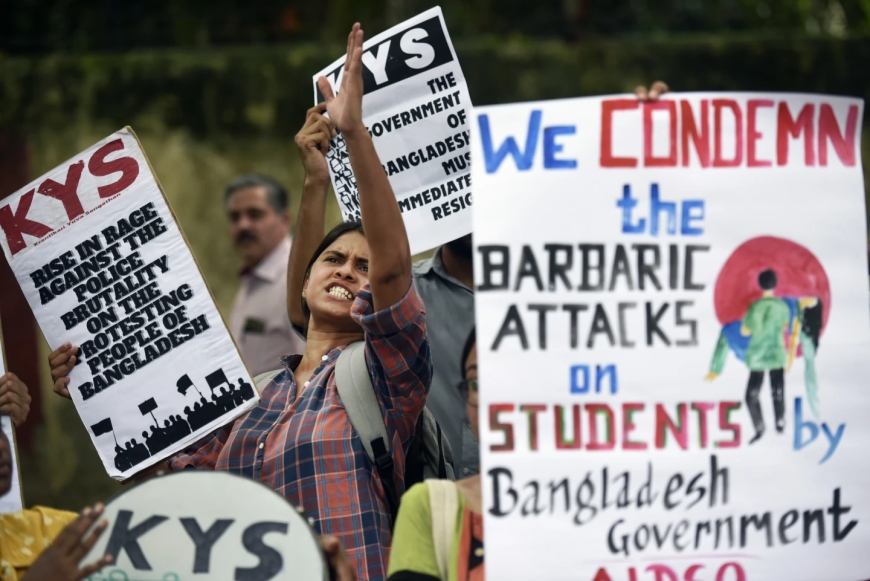Bangladesh Security Forces Confront Escalating Protests Over Government Job Quotas
The streets of Dhaka were the scene of intense clashes on Friday as Bangladeshi security forces fired bullets and tear gas at protesters, following a surge in demonstrations over government job allocation. The protests, which have turned increasingly violent, reflect deepening frustration over a contentious job quota system and have led to significant disruptions in the capital.

The streets of Dhaka were the scene of intense clashes on Friday as Bangladeshi security forces fired bullets and tear gas at protesters, following a surge in demonstrations over government job allocation. The protests, which have turned increasingly violent, reflect deepening frustration over a contentious job quota system and have led to significant disruptions in the capital.
The demonstrations, which began several weeks ago, have escalated sharply, culminating in one of the deadliest days of unrest on Thursday. Local media reported that 22 people were killed during clashes, although official figures have yet to be confirmed. The violence has underscored the growing discontent among young graduates facing limited employment opportunities in a struggling economy.
On Friday, police and paramilitary forces engaged protesters with live ammunition, tear gas, and sound grenades. The security crackdown resulted in at least four additional deaths, as reported by local television channel Somoy TR. The situation was exacerbated by disruptions to internet and mobile services, which were reportedly cut off in an effort to quell the unrest. The Telecommunication Regulatory Commission cited an attack on their data center by demonstrators as the reason for the outages.
Protesters' Demands and Government Stance
The protesters are demanding the abolition of a quota system that allocates up to 30% of government jobs to the relatives of veterans from Bangladesh's 1971 war of independence. They argue that the system is discriminatory and favors supporters of Prime Minister Sheikh Hasina's ruling Awami League party. The students are calling for a merit-based system to replace the current quotas.
Prime Minister Hasina has defended the quota system, emphasizing the importance of honoring the contributions of war veterans. Despite Hasina's efforts to maintain the quota system, it has become a flashpoint for broader discontent amid rising inflation and economic challenges exacerbated by the global fallout from the Ukraine conflict.
Security Forces' Actions and Public Reaction
The unrest reached a peak on Thursday when protesters attacked the headquarters of state-run Bangladesh Television, setting fire to vehicles and causing significant damage. Border guards were seen firing at a large crowd outside the building, while police used tear gas and rubber bullets to disperse the protesters.
An Associated Press reporter on the scene described a chaotic environment, with streets littered with bullet casings and bloodstains. The violence has sparked widespread criticism of the government's handling of the protests and its response to public grievances.
Impact on Education and Public Services
In response to the unrest, several universities have suspended classes and closed dormitories. The widespread disruptions have also affected essential services, including flights, banking, and media outlets. The government’s decision to restrict gatherings and impose curfews has further fueled frustration among citizens, leading to calls for continued demonstrations and public outcry.
Political and Social Implications
The ongoing violence has highlighted deep-seated issues within Bangladesh’s governance and economic policies. The unrest has prompted international concern over the human rights implications of the government's response and the impact on the country’s democratic processes.
Saad Hammadi, policy and advocacy manager at the Balsillie School of International Affairs, criticized the government's approach, suggesting that the suppression of dissent through internet shutdowns and heavy-handed security measures exacerbates the crisis. Hammadi called for a more open dialogue and a fair resolution to the grievances of the protesting students.
Opposition Support and Future Prospects
The main opposition party, the Bangladesh Nationalist Party (BNP), has voiced support for the student protesters and has vowed to organize its own demonstrations. BNP supporters clashed with police on Friday, resulting in the arrest of senior BNP leader Ruhul Kabir Rizvi. The opposition accuses Hasina's government of exacerbating the violence and suppressing dissent.
The High Court's recent decision to reinstate the job quotas after a previous suspension has further inflamed tensions. The Supreme Court has temporarily stayed the ruling pending an appeal, with a hearing scheduled for Sunday. In a televised address, Hasina urged patience and expressed confidence that the court would deliver justice to the students.
The situation remains fluid, with both sides preparing for further confrontations as the country grapples with the fallout from the ongoing protests and the broader challenges facing Bangladesh's political and economic landscape.













































